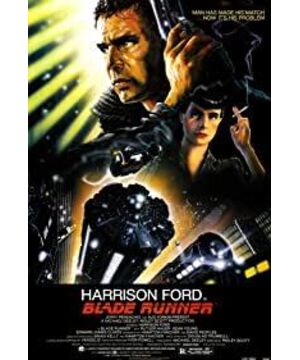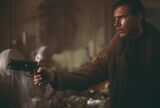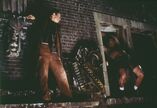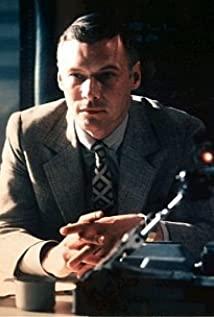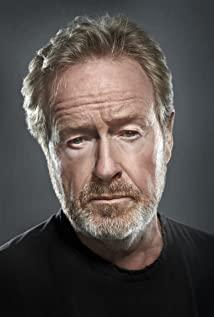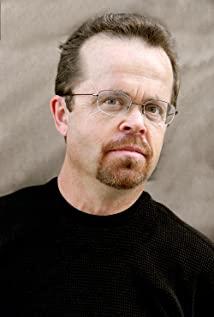Text / Yang Yiyi
" I've seen things you people wouldn't believe.
Attack ships on fire off the shoulder of Orion.
I watched c-beams glitter in the dark near the Tanhauser Gate.
All those...moments will be lost...in time.
Like...tears...in rain.
Time...to die.”
"What I have seen, you humans are absolutely unbelievable.
I have seen battleships searing on the edge of Orion.
I watched C-rays pass through the 'Tanweather Gate' in the dark cosmic space.
All these fragments, however, will be overwhelmed by time,
Like tears, disappeared in the rain. "
In Los Angeles in 2019, the rain kept pouring on his blood-stained silver hair and dark blue skin.
Roy Batty, the leader of the clones, babbled out those poetic sentences, then lowered his head forever with a relieved and sarcastic smile.
The Argentine writer Borges wrote in his short story "Another Death": "Then he 'died' and his faint image disappeared, as if water disappeared in water."
In the 21st century, humans have created a large number of replicants for slave labor, dangerous work and other planetary colonization tasks in the outer world. After the bloody insurrection of the 6th battle group of the outer colony chain, the replicators were declared illegal on the earth - they must be executed. The Secret Service - Blade Runner was ordered to detect any invading replicants and shoot them down. The replicators who had only four years of factory settings defected back to Earth in an attempt to find the "Creator" and seek a way to keep them alive, but the result was - "unchangeable".
In Los Angeles in 2019, after another world war, most of the human beings have gone to alien colonies. The clone leader Roy Batty was chased by Rick Deckard, one of the blade runners, to the roof of the rainy building and said the opening paragraph.
This Hamlet-esque line, said to have been improvised by Dutch actor Rutger Hauer who played the replicant Roy Batty at the time, resonated far and clearly with the noble Danish prince of the eighth century—
“To be, or not to be: that is the question:
Whether it's nobler in the mind to suffer
The slings and arrows of outrageous fortune,
Or to take arms against a sea of troubles,
And by opposing end them?
…
To survive or to perish, this is a question worth considering;
To endure the poisoned arrow of fate's tyranny in silence,
Or stand up against the boundless suffering of the world,
Sweep them by struggle,
Which of these two acts is more noble? "
It is the Danish prince who is a "human", and he can ask one of his soul questions to fate, but is a "replicant" a "human"?
The puzzling "Tanweather's Gate" in the lines has another meaning and may help us get closer to the truth of the mystery - "Tanweather" is a three-act German musician Wagner based on medieval legends. The opera depicts the story of a young knight and bard, Tang Huaisel, who fell in love with the glamorous Venus in the illusory world, but finally returned to the real world and rekindled the love with the holy and beautiful Elizabeth (but Elizabeth was the one who rescued Tang Huaisel. The soul and the fragrance of jade perished).
In it, Tang Huaisel sang the pleasures of the flesh, and in the sinking of love, he launched a cruel ideological struggle between "spirit" and "flesh". But the paradox is that his happiness in the illusion is "real"? Just as the issue of replicants - their bodies and memories are no different from people - "Tanweather's Gate" is the gate through reality and illusion - when they are completely opened up, replicators have the same technology as human beings through technology. Body and spirit, then, are they also "humans"?
The more perfect things are, the more fatally flawed they are. The flaw of artificial humans is that they are too perfect, even more than "human", so the speed of the end of life is calculated by lightning, which is quite "floating life, mayfly one day" feeling.
For the replicators, in just four years, the whole life has not yet fully unfolded. The decades of life of normal human beings are completely unreal to them, they are just used as a tool, and they will burn once they are used.
One step further - when the human body is implanted with a chip program and has corresponding computer code settings, does he also lose the qualification to become a complete "human"?
Where is the border between "replicants" and "humans"?
Humans created "replicants", who created us?
Ancient Chinese books record that the ancestor Nuwa used yellow clay to imitate herself to create a human being; Qu Yuan sighed in "Tianwen": "Nuwa has a body, who made it?" What he asked was: "Nuwa created someone else's body, then who created her own body?"
In ancient Greek mythology, Prometheus, the descendant of the Titans, used clay to create human beings in the shape of his own body and acted as the patron saint and mentor of human beings; because he could not bear to see them living in frost and cold, he disobeyed Zeus' order to steal. Taking the fire from the sky and passing it to the human world, he was tied to the Caucasus Mountains and punished by the eagles pecking the internal organs day after day. The torch relay ceremony of the Olympic Games, first held in 1936, was to commemorate the mythical hero.
British writer Mary Shelley, known as the mother of science fiction, wrote Frankenstein, the first science fiction work in literary history, in 1818, when she was only 20 years old. It is about a biologist who is keen to create life, burying his head in the corpse all day long, piecing together a "monster" from different corpses; however, when the monster whose face is covered with copper wire patches staggers and stands up, When he smiled at him, he was frightened and fled - only God is qualified to create life out of nothing, and only the life created by God is beautiful, and once people go beyond their own boundaries, try to obtain "God's". Qualifications, then what they create can only be "monsters".
However, after reading this book, you will find that the most humane and sympathetic person in the book is not any of the human beings in it, but the "monster" created by people from corpses.
Mary Shelley became pregnant with the child of English poet Percy Shelley at the age of 17, but during this period the latter fell in love with her sister. The death of a child shortly after birth was a huge blow to Mary Shelley—a mother whose loss of her young beloved child forced her to think about the relationship between life and death, creation and destruction.
In "Frankenstein", the monster asks for warmth and love from his creator, but can't; he rescues a girl who falls into the water, but he is not sympathized and accepted by humans, so cruelty and tyranny begin to sweep him The original kind and gentle heart, the lovers and friends beside the creator died one after another.
"Blade Runner", filmed in 1982, is a well-known "stuffy film".
The whole film unfolds in the psychedelic electronic lights of cyberpunk, the turbulent narrative rhythm, the dense water vapor, and the slow and hesitant soundtrack, which makes people feel like falling into the fog; between.
Although it is also called the greatest sci-fi film in film history with the American director Kubrick's "2001: A Space Odyssey", it is still difficult to change the business prospects of the sequel "Blade Runner 2049", which was filmed in 2017. , the artistic connotation of high and low destiny.
Killer Dick faces the replicant Roy, with complicated feelings. This "product", which is the same as himself but not the same as himself, seems to be hovering between the devil and the angel - the silver unicorn origami thrown on the floor tile at the end of the film implies that the killer Dick himself is also The fact of replicating people - he often dreams of unicorns, it can be seen that the content of his dreams has been artificially transplanted, otherwise who can see his dreams?
The puzzled and confused expression on his face was actually the true character of Harrison Ford, who played Dick - at that time, as an actor, he didn't think there was anything unique about this movie during the shooting process, and he and The director of the film, Ridley Scott, had a bad relationship, not to mention that he could have predicted that the film would become a masterpiece after many years. His depression and blurred eyes were completely from the heart, and there were doubts about the content of the filming, and there were also The tiredness and disgust mixed with the muddy water and rain at work - it is precisely this kind of sincere expression that somehow achieves some kind of spiritual fit with the core of the film.
After a fierce chase between the two before, Roy was almost insane; he was naked, covered in blood and stains, and his mood was weird, just like the Frankenstein created by Frankenstein. However, this "replicant" imitated according to the most elite and high-quality example of human beings should not be like this - he is handsome and fit, with a noble character, full of artistic accomplishment and elegant sentiments, he should be dressed in a tuxedo and playing the piano, a handsome gentleman ——He just wants to get the right to live like a "human".
Inside the ornate, abandoned, medieval castle-like building, they stomped on eerie background music, and the giant propellers of several exhaust fans cut light back and forth. They struggled to and fro between the rococo-style colonnades, occasionally accompanied by a chilling howl—the ruins of human civilization—an apocalyptic scene forsaken by God.
When Dick was about to fall into the abyss and struggled on the slippery colonnade, Roy stretched out the hand that had been inserted into the steel nail and grabbed his falling body - the replicant saved the killer - At that moment, the replicant seemed to have become a "God" like Jesus Christ, not only human nature, but also the brilliance of "divine nature" resurrected in him.
Replicant Roy Batty, who died in the film in 2019 in damp, dark, neon-lit Los Angeles (neon, a gas filled with neon signs used in outdoor billboards), and his actor, who was born in the 1940s Dutch actor Rutger Hauer passed away on July 19, 2019 - a perfect coincidence that broke the screen, linking the real and the virtual.
No one is born a monster, human or replicator; real monsters are always "people" who are crazy about technology and lose love and hope.
Standing in the middle of 2020, looking back at the dark and foggy past, countless people are looking forward to restarting this year. At a time when artificial intelligence continues to make breakthroughs and progress, we are faced with increasingly convenient networks and smartphones, and our fingers are sliding across the cold screen, and it seems that everyone is more and more trapped in an island.
We longed for each other and were afraid of hurting each other; so we hid in the virtual world and played the game of talking to ourselves.
"Heaven and earth are not benevolent, and all things are dogs."
So, what can beat time?
How can we go beyond death?
Or, where will the future of humanity end up in such shaking?
Perhaps the answer is simple and crude - "only 'love' can" - in fact, it is undeniable that we all long for hugs, for friendship and kindness - to touch each other's fingers, to feel the sound of clothes rubbing against each other, to hear The warm breath and the birdsong among the trees; and the warmth when the eyes meet, the pupils seem to be able to radiate a whole universe of light and miracles.
Imagine Roy Batty, the clone who saved killer Dick's last life, closing his eyes in a Noah's Ark-like downpour; the four-year "production time" has expired.
He let the white dove in his hand fly to the endless sky behind him.
View more about Blade Runner reviews


